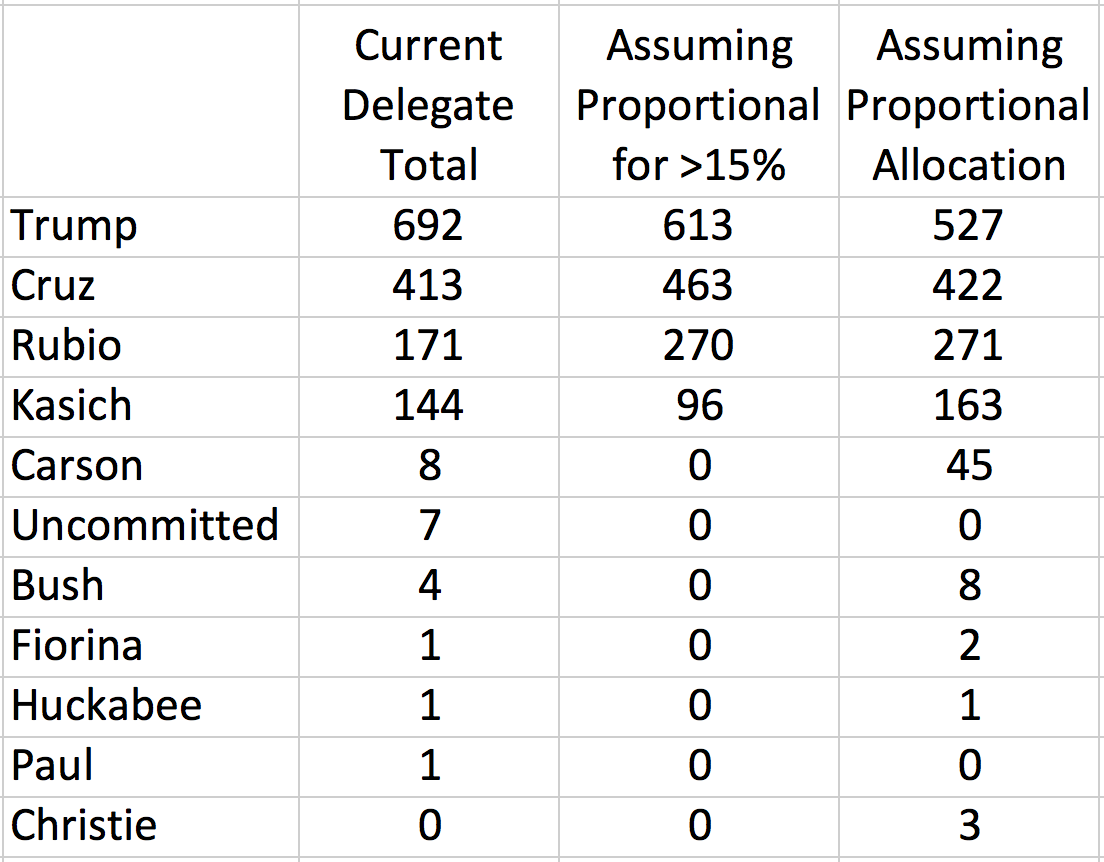Ever since Donald Trump established himself as the clear frontrunner in the Republican primary, there has been a lot of talk, particularly from the anti-Trump Republican establishment, about the possibility of a brokered convention. It has been clear for some time that Trump would almost certainly wind up with the largest number of pledged delegates. However, if he has fewer than 50% of the delegates going in to the convention, he won’t win the nomination on the first ballot, and the voting rules make it possible for the Republicans to consolidate anti-Trump support around someone else. This could be Cruz or Kasich, or it could be someone else entirely, like Mitt Romney’s suggestion: Mitt Romney!
But is that possible? Under the Republican delegate allocation schemes in the upcoming primaries, almost certainly not. In fact, if he wins only 40% of the vote in each state, but continues to beat Cruz and Kasich, he will coast to the nomination easily.
Yesterday I posted an updated calculation comparing the current Republican delegate counts to what those counts would be if the Republicans used a more proportional delegate allocation scheme. Here’s that table, again. (Details, notes, and caveats can be found in the original post.)
There’s not a qualitative difference in the delegate totals, or in the apparent state of the race. Trump is the clear frontrunner, with a sizeable lead over Cruz. But, in terms of the possibility of a brokered convention, the difference is huge.
In all of the Democratic primaries, delegates are allocated proportionally among all of the candidates who receive more than 15% of the vote (some statewide, and some by congressional district). If the Republicans had used this scheme in all of the primaries and caucuses to date, Trump would currently have about 613 delegates, and he would need to win 624 of the approximately 1000 delegates remaining in order to capture the nomination on the first ballot. Under proportional allocation, that would require him to receive more than 60% of the vote from here on out.
That’s not impossible, of course, but it’s pretty close. Trump has earned more than 50% of the vote in only one contest to date: the Northern Mariana Islands. And even after Rubio’s withdrawl from the race, he is still polling below 50% nationally among Republicans. So, under a proportional-allocation scheme, Trump would probably be expected to wind up with about 1100 delegates, well short of the 1237 he needs. The party would then be in a position to select a different nominee. Whether or not they would do it, I don’t know, but they would have the option.
But, that’s not the scheme they have. The Republican process involves a variety of delegate-allocation schemes, but, on average, they are more winner-take-all than the Democratic scheme. As the race stands, Trump needs only 545 of the remaining delegates to claim the nomination on the first round. And, if he is able claim a plurality of the vote in most of the remaining contests (as the polling suggests he will), he will easily exceed that number.
Here’s a breakdown of how the remaining Republican delegates are going to be allocated:
Six states award all of their delegates to the state-wide winner: Arizona 58, Delaware 16, Montana 27, Nebraska 36, New Jersey 51, and South Dakota 29, for a total of 217.
Six states award a fraction of their delegates to the state-wide winner: California 10, Indiana 30, Maryland 14, Pennsylvania 17, West Virginia 22, and Wisconsin 18, for a total of 111.
Six states award a fraction of their delegates in a winner-take-all manner, but broken down by congressional district (3 delegates per CD): California 159, Connecticut 15, Indiana 27, Maryland 24, West Virginia 9, and Wisconsin 24.
Oregon and Utah allocate proportional to the statewide vote (28 and 40 delegates, respectively), with a winner-take-all trigger at 50% in Utah.
Five states award a fraction of their delegates proportional to the statewide vote: Connecticut 13, New Mexico 24, New York 14, Rhode Island 13, and Washington 14, for a total of 78.
Three states use proportional allocation within individual congressional districts: New York 81, Rhode Island 6, and Washington 30, for a total of 117.
Finally, there are 88 weird delegates, who will go to the convention formally unpledged. 6 delegates from American Samoa and 28 from North Dakota will be chosen by party caucuses, but not rely on a popular vote. In Pennsylvania, 54 delegates will be elected from the 18 congressional districts. They will have announced whom they intend to support, but will not be bound.
So what happens if Trump gets only 40% of the vote in each state, but continues to beat Cruz and Kasich? Well, he wins 328 delegates from the state-wide winner-take-all allocations. He probably also wins the vast majority of the congressional-district winner-take-all delegates, but if we conservatively give him only half of those, that’s another 129 delegates. If we give him 40% of the proportional-allocation delegates, that’s another 105.
That’s a low-ball estimate of 562 right there. And that’s not including any Pennsylvania delegates, who, if they’ve indicated their support for Trump, are probably actual Trump supporters, and would vote for him at the convention, even if they don’t have to.
More realistically, 40% statewide probably earns him at least 70% of the winner-take-all by congressional district delegates, as well as 70% of the 54 unpledged Pennsylvania delegates.
That’s 651, more than 100 delegates in excess of what he’ll need to claim the nomination on the first ballot.
So, bleeding away delegates from Trump at the margins is no longer a viable anti-Trump strategy. If the Republicans want a brokered convention, they’ll need for one of the other candidates to actually beat him, probably in at least three or four of the remaining states. Given that most of the remaining states do not have large evangelical populations, and are not Ohio, that could be a real challenge.
